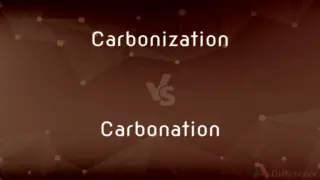Pubescent vs. Adolescent — What's the Difference?
By Fiza Rafique & Maham Liaqat — Updated on May 10, 2024
Pubescent describes someone undergoing the physical changes of puberty, while adolescent refers to the broader teenage period encompassing physical, emotional, and social growth.

Difference Between Pubescent and Adolescent
Table of Contents
ADVERTISEMENT
Key Differences
The pubescent phase is a narrower period focused on the biological process of reaching maturity. Adolescence begins before puberty and continues into early adulthood, involving major shifts in identity formation and social relationships.
While someone who is pubescent is typically within the early adolescent range, an adolescent may have already completed puberty yet still faces the challenges of transitioning into adulthood.
The term pubescent is more specific, used to describe the physiological stage directly, whereas adolescent encompasses various aspects of growth, including education, relationships, and psychological development.
Comparison Chart
Definition
Person experiencing puberty
Broad developmental teenage stage
Focus
Physical changes
Physical, cognitive, and emotional growth
ADVERTISEMENT
Time Frame
Specific to puberty
Encompasses pre- and post-puberty
Primary Aspect
Hormonal changes
Identity formation and social development
Social Implications
Limited
Increased societal expectations
Compare with Definitions
Pubescent
In or related to the stage of puberty.
The pubescent child began to notice changes in their voice.
Adolescent
Person in the teenage years.
The adolescent struggled with balancing school and social life.
Pubescent
In the process of maturing.
As they became pubescent, they showed interest in dating.
Adolescent
Period involving significant growth and change.
The adolescent years can be both exciting and challenging.
Pubescent
The stage between childhood and maturity.
Parents often provide guidance to their pubescent children.
Adolescent
Psychological and emotional development period.
The adolescent sought advice on managing relationships.
Pubescent
Covered with soft downy hair.
The leaves were pubescent with a soft, fuzzy texture.
Adolescent
The time frame between childhood and adulthood.
Adolescents are often guided through career choices.
Pubescent
Reaching or having recently reached puberty.
Adolescent
Pertaining to the broader teenage developmental stage.
Adolescent behavior can be unpredictable due to rapid changes.
Pubescent
Covered with short hairs or soft down.
Adolescent
Of, relating to, or undergoing adolescence.
Pubescent
At or just after the age of puberty.
Adolescent
Characteristic of adolescence; immature
An adolescent sense of humor.
Pubescent
Covered with down or fine hairs.
Adolescent
A young person who has undergone puberty but who has not reached full maturity.
Pubescent
An individual who is going through puberty.
Adolescent
Of, relating to, or at the age of adolescence; at the stage between being a child and an adult.
Pubescent
Arrived at puberty.
That . . . the men (are) pubescent at the age of twice seven, is accounted a punctual truth.
Adolescent
A person who is in adolescence; someone who has reached puberty but is not yet an adult.
Pubescent
Covered with pubescence, or fine short hairs, as certain insects, and the leaves of some plants.
Adolescent
Growing; advancing from childhood to maturity.
Schools, unless discipline were doubly strong,Detain their adolescent charge too long.
Pubescent
Covered with fine soft hairs or down;
Downy milkweed seeds
Adolescent
A youth.
Adolescent
A juvenile between the onset of puberty and maturity
Adolescent
Relating to or peculiar to or suggestive of an adolescent;
Adolescent problems
Adolescent
Being of the age 13 through 19;
Teenage mothers
The teen years
Adolescent
Displaying or suggesting a lack of maturity;
Adolescent insecurity
Jejune responses to our problems
Their behavior was juvenile
Puerile jokes
Adolescent
In the state of development between puberty and maturity;
Adolescent boys and girls
Common Curiosities
What is the main difference between pubescent and adolescent?
Pubescent focuses specifically on physical changes during puberty, while adolescent covers a broader teenage developmental period.
Do pubescent changes occur only in adolescence?
Yes, puberty typically happens in adolescence, but its timing can vary for each individual.
Can someone be pubescent but not an adolescent?
Not exactly, as puberty generally occurs during adolescence, but pubescent describes a narrower period.
Are adolescents always pubescent?
Not necessarily. Adolescents may have already gone through puberty or may be in different stages of it.
Can the pubescent stage affect academic performance?
Yes, physical changes and fluctuating emotions can impact concentration and focus.
Is adolescence purely a biological stage?
No, it also includes emotional, psychological, and social growth.
How does adolescence impact cognitive development?
Adolescence involves significant brain development, leading to improved reasoning and decision-making.
Are social changes part of being pubescent or adolescent?
Social changes are more associated with adolescence, while being pubescent focuses more on physical transformations.
What challenges are unique to pubescent individuals?
They often deal with the stress of rapid physical changes and increased sensitivity about body image.
Do pubescent changes influence social behavior?
Yes, hormonal changes can lead to mood swings and evolving social interests.
Does the adolescent period vary by culture?
Yes, cultural norms can influence how adolescence is perceived and the expectations placed on adolescents.
What role do hormones play in adolescence?
Hormones trigger puberty and influence mood swings, emotional responses, and energy levels.
How does adolescence differ from adulthood?
Adolescence involves identity exploration, educational choices, and gradual independence, while adulthood typically features established responsibilities.
Why is adolescence important for personal development?
It provides opportunities to explore identity, relationships, and career aspirations, laying a foundation for adult life.
Share Your Discovery

Previous Comparison
Carbonization vs. Carbonation
Next Comparison
Provisional vs. ProvisoryAuthor Spotlight
Written by
Fiza RafiqueFiza Rafique is a skilled content writer at AskDifference.com, where she meticulously refines and enhances written pieces. Drawing from her vast editorial expertise, Fiza ensures clarity, accuracy, and precision in every article. Passionate about language, she continually seeks to elevate the quality of content for readers worldwide.
Co-written by
Maham Liaqat















































